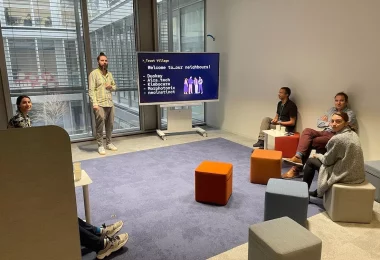Harnessing the promise of emerging quantum technologies, Western Switzerland is shaping up to be a pivotal region in this transformative field.
Quantum technologies represent a groundbreaking scientific field based on the principles of quantum mechanics, the theory of physics that describes nature at the smallest scales, such as atoms and photons. These technologies exploit the unique behaviors of quantum states—such as superposition, entanglement, and quantum tunneling—to create solutions that are fundamentally different and often more powerful than their classical counterparts.
The economic interest in quantum technologies stems from their potential to revolutionize various industries. Quantum computing, for example, promises to solve complex problems far beyond the reach of classical computers, offering advancements in drug discovery, materials science, and optimization problems. Quantum cryptography introduces new levels of security in data transmission, appealing to sectors like finance, defense, and telecommunications. The precision of quantum sensors has applications in navigation, geological surveying, and medical imaging, which can lead to significant commercial and societal benefits. The versatility and transformative potential of these technologies make them economically significant, attracting investments and driving innovation in multiple sectors.
A fertile ground for quantum innovation
Western Switzerland is shaping up to be a pivotal region for the development of quantum technologies. The region, known for its rich history in scientific research and innovation, offers a unique ecosystem where academia, industry, and government collaborate closely. The presence of world-renowned universities, cutting-edge research facilities, and a supportive policy framework creates an ideal environment for quantum research and development.
The universities and research institutions of Western Switzerland provide not only a foundation of fundamental research but also a pipeline of skilled talent essential for the growth of this high-tech sector. Moreover, the region’s culture of innovation, coupled with a strong tradition in precision engineering and microtechnology, aligns perfectly with the intricate requirements of quantum technology development.
The University of Geneva’s quantum research
The University of Geneva (UNIGE) is renowned for its advanced research in quantum communication and cryptography. Under the guidance of luminaries such as Professor Nicolas Gisin, UNIGE has carved out a unique position in the quantum technology sphere, particularly in secure communication. Through its Geneva Quantum Centre, The university’s work extends beyond theoretical exploration, venturing into practical applications that promise to reshape how secure communication is understood and implemented globally.
CERN’s Quantum Technology Initiative
The European Organization for Nuclear Research (CERN) is widely recognized for its contributions to particle physics, yet its impact on quantum technology is equally significant. While not directly engaged in quantum research, CERN’s state-of-the-art facilities and collaborative ethos have indirectly fostered advancements in quantum technologies. Through its Quantum Technology Initiative (QTI), the organization’s role as a nexus for global scientific cooperation provides an unparalleled platform for exchanging ideas and innovations, which often ripple into the quantum realm.
Commercializing quantum research
ID Quantique stands as a shining example of how academic research can successfully transition to the industry. Originating from the University of Geneva, ID Quantique has become a global leader in quantum-safe cryptography and quantum communication solutions. Its journey from a university project to a market leader encapsulates the dynamic and innovative spirit of Western Switzerland’s academic community, representing not only the commercial viability of quantum technologies, but also highlighting the region’s ability to foster entrepreneurship in cutting-edge scientific domains.
EPFL’s Quantum Hub
The École Polytechnique Fédérale de Lausanne (EPFL) represents another pillar of quantum excellence in Western Switzerland. With a plethora of research groups delving into various facets of quantum technology, EPFL has become a hub for quantum innovation. The institution’s Center for Quantum Science and Engineering (QSE Center) operates as a hub to establish and promote programs for cross-disciplinary research, education and innovation in the fields of quantum science and engineering at EPFL.
Switzerland’s nationwide quantum leap
While Western Switzerland is shaping hub to become a hub for quantum technology development, the country’s national initiatives play a pivotal role in fostering quantum research and application across Switzerland, encompassing a wide range of projects, from fundamental research to applied quantum computing and communications, engaging various institutions and industries across the country.
One of the key national initiatives is the Swiss Quantum Initiative (SQI), which aims to consolidate Switzerland’s strong position in the quantum field and enhance its international competitiveness. The SQI focuses on facilitating collaboration between academic and industrial partners, providing a platform for innovation and knowledge exchange. Furthermore, the Swiss Quantum Commission, established in 2023 under the Swiss Academy of Sciences, plays a critical role in shaping research directions, developing infrastructure, and creating specialized educational programs to reinforce Switzerland’s global standing in quantum technologies.
Swiss institutions are also actively participating in international quantum projects and collaborations, significantly contributing to global advancements in quantum science. One notable example of this international engagement is Switzerland’s collaboration with the European Quantum Flagship, a large-scale, ten-year initiative aimed at consolidating and expanding European scientific leadership and excellence in quantum research. Swiss researchers and institutions are involved in various projects under this initiative, collaborating with other European countries to develop quantum technologies in areas like computing, communication, and sensing.
In parallel, the National Center for Competence in Research – SPIN (NCCR SPIN), initiated in 2020, is making significant advancements in silicon-based quantum computing. This initiative represents a collaborative effort among the University of Basel, IBM Research – Zurich, ETH Zurich, and EPFL, combining expertise from various disciplines like quantum physics, materials science, and engineering.
Last but not leaset, the Geneva Science and Diplomacy Anticipator (GESDA), which is supported by Swiss and Geneva governments, monitors and anticipates the impact of quantum technologies on future societal and environmental challenges.
A key influencer in the realm of quantum technology
Western Switzerland’s emergence as a pivotal hub for quantum technologies, underpinned by Switzerland’s strategic national policies, showcases a comprehensive dedication to propelling quantum research and applications forward. The region’s commitment to fostering academic distinction and its proactive role in creating global alliances anchor it as a key influencer in the realm of quantum technology. This harmonious blend of regional expertise and nationwide efforts plays a critical role in reinforcing Switzerland’s dominance in the quantum sector, driving forward innovation, and setting international benchmarks in this dynamic and rapidly advancing field.




